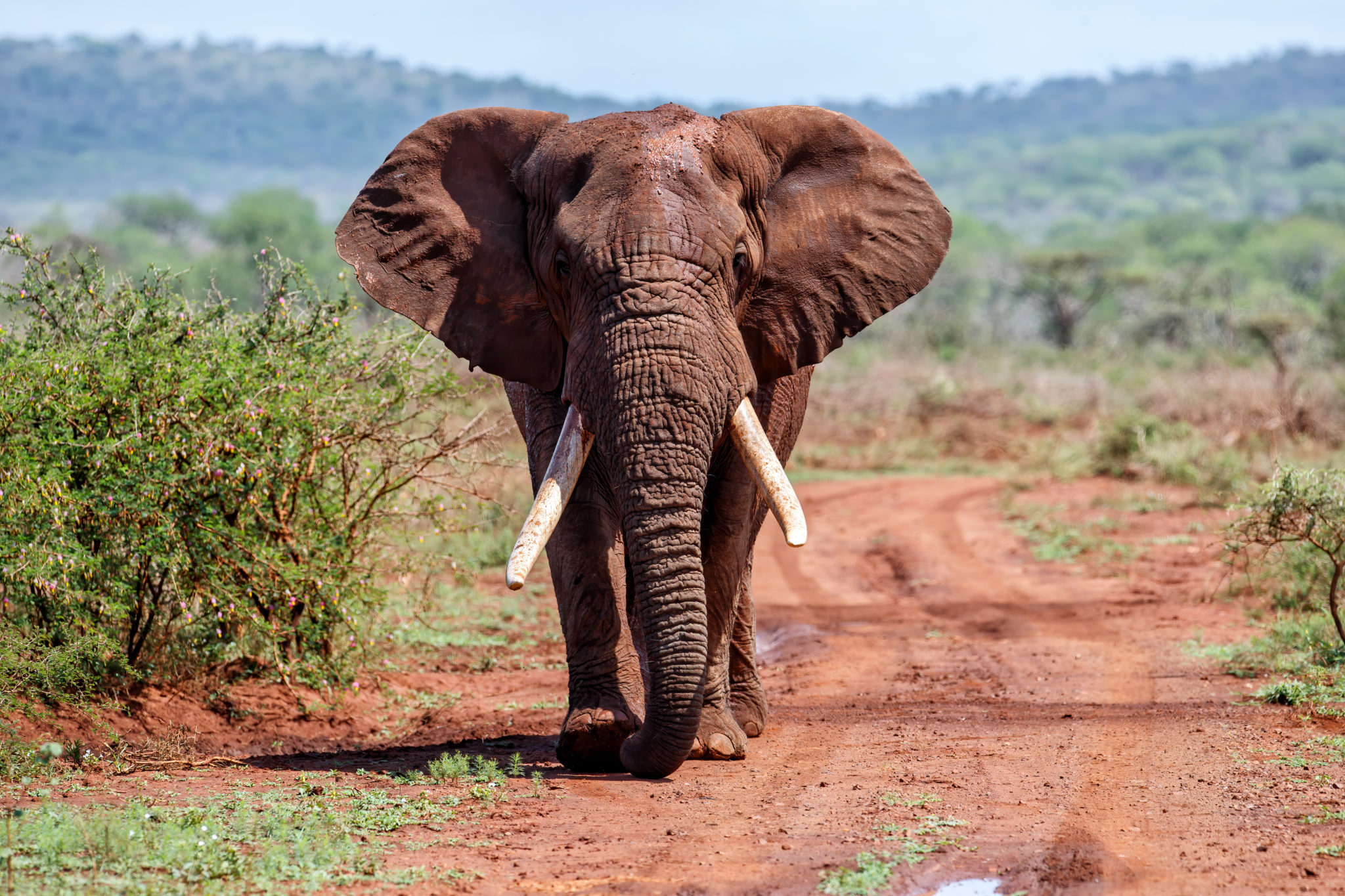
What if we could reduce illegal wildlife trafficking by disrupting the illicit supply chain that enables protected wildlife species to be carried across borders and into the hands of buyers?
A CSU College of Business professor, John Macdonald, is part of a unique interdisciplinary team that’s examining illegal activity through the lens of supply chains.
Macdonald, an associate professor in the Department of Management, spent the first 15 years of his academic career studying how companies can prevent and recover from supply chain disruptions. He was focused on the kinds of disruptions that we saw during the height of the COVID-19 pandemic, from toilet paper shortages to furniture delays.
Until a few years ago, he had never considered using his expertise to research how to intentionally disrupt a supply chain – but that’s exactly what he and his colleagues are doing.
“By analyzing the characteristics of illicit trade from a business and logistics perspective, we’re aiming to stimulate the kind of research needed to reduce illegal wildlife trafficking around the world,” Macdonald said. “We believe that disrupting a supply chain could be a powerful crime-fighting tool.”
In “Advancing interdisciplinary science for disrupting wildlife trafficking networks,” published recently in the Proceedings of the National Academy of Sciences (PNAS), Macdonald and his coauthors use the example of illicit ploughshare tortoise networks in Madagascar to advocate for a multi-disciplinary approach to eliminating illegal wildlife trafficking.

“Advancing interdisciplinary science for disrupting wildlife trafficking networks”
Meredith L. Gore1, Emily Griffin², Bistra Dilkina³, Aaron Ferber³, Stanley E. Griffis⁴, Burcu B. Keskine⁵, John Macdonald
Proceedings of the National Academy of Sciences
1 University of Maryland
² Babson College
³ University of Southern California
⁴ Michigan State University
⁵ University of Alabama
As one of the rarest tortoises in the world, ploughshare tortoises have been protected by law in Madagascar since 1960, but they continue to be poached and sold as pets. By examining the case of the ploughshare tortoises through an interdisciplinary lens, local officials could discover vulnerabilities in the wildlife trafficking network’s supply chain and determine how resilient the supply chain would be in the face of disruption.
“Research journals often publish work focused in one umbrella discipline, such as conservation or business,” Macdonald said. “One outcome of the research work is the call for journals to be willing to publish work utilizing an interdisciplinary approach, as this will signal to researchers that such approaches are welcome. The example of ploughshare tortoises showed that interdisciplinary efforts may be more effective than single-discipline efforts.”
Funded by an $809,666 grant from the National Science Foundation, Macdonald has coauthored a total of four articles on the topic of illegal wildlife trafficking over the past academic year.
In addition to the PNAS research, his team has published “Quantitative Investigation of Wildlife Trafficking Supply Chains: A Review,” in Omega; “Illicit Activity and Scarce Natural Resources in the Supply Chain: A Literature Review, Framework, and Research Agenda,” in the Journal of Business Logistics; and “A Data Directory to Facilitate Investigations on Worldwide Wildlife Trafficking,” in Big Earth Data.
“The PNAS article advocates for the aforementioned interdisciplinary approach,” Macdonald said. “This approach is then used as a framing in several subsequent articles: first, to look at the current knowledge state and gaps between illicit activity and scarce natural resources, such as certain minerals; second, identifying appropriate operations research techniques to answer important questions about the structure, operations and drivers of illicit networks; and third, to further break down communication barriers with a directory of available data resources for other researchers around the world to utilize.”
‘A Pervasive and Global Problem’
Illegal wildlife trafficking is an extremely profitable crime, with an estimated value between $5 to $35 billion per year, according to a citation in Macdonald’s Omega article. The crime is driven by strong demand for wildlife and wildlife products, which have a wide range of uses, including fashion, food and traditional medicine.
It can be difficult to crack down on wildlife crime, in part because it spans more than 150 countries and more than 37,000 species of animals and plants. But the scale of the problem only makes it more important for researchers to understand how supply chains are used for criminal activity.
Through their work, Macdonald and his colleagues are hoping to encourage social and environmental sustainability in areas beset by illegal wildlife trafficking.
“The illicit wildlife trade is a pervasive and global problem that has far-reaching impacts on both society and the environment,” the Omega article explains. “Aside from threatening numerous species around the world and acting as a potential disease transmission vector for several zoonotic diseases, including the COVID-19 pandemic, this complex system is often linked with other illicit networks such as drugs, weapons and human trafficking.”
Research into illegal supply chains is also becoming increasingly important as countries begin to pass laws that deal with sustainability and supply chains, Macdonald said. These new laws – and increased social awareness – are pressuring companies around the world to better understand their operations.
The Power of an Interdisciplinary Team
Wildlife crime has often been researched from a conservation biology perspective, but it has only recently gained visibility as part of an integrated supply chain, criminology, operations research and artificial intelligence problem, Macdonald said.
In the PNAS article, he and his coauthors demonstrate how examining illegal wildlife trafficking networks’ supply chains could be key to stopping them, specifically signaling that different interdiction and disruption strategies could be tested on empirical data through machine learning and computational modeling.
The team’s very existence is a testament to the power of an interdisciplinary approach, uniting several logisticians — Macdonald included — as well as conservation criminologists and computer science researchers.
The beauty of this kind of approach is that each researcher approaches the problem with a different perspective, Macdonald said. Academics have been researching how to stop illegal wildlife trafficking for decades — just not through the lens of logistics. But with this effort, researchers from different disciplines are coming together to combine their ideas.
Take, for example, a conversation that Macdonald and two of his colleagues had about the pangolin, the most trafficked animal in the world. Macdonald and Stanley Griffis, a logistician at Michigan State University, were talking with Meredith Gore, a conservation criminologist at the University of Maryland, about how to potentially disrupt the supply chain for trafficking the scaly mammals.
“Stan was talking with Meredith, and said, ‘Well, wait a second, that’s fresh meat, right? Oh, well that needs to be kept fresh, and that’s a cold chain problem,’” Macdonald said. “She said, ‘Wait, what’s cold chain?’ Well, that’s just refrigerated supply chain, which we use all the time.
“That got her brain going, and she said, ‘Well, if you’ve got to keep this much meat fresh, where would there be warehouses that would have electricity in the Democratic Republic of Congo?’ It’s using the terms that both of us know, but we just hadn’t put them together.”
‘The Building Blocks of Synthesis’
Because this type of interdisciplinary research into disrupting illegal wildlife trafficking hadn’t been done before – and because the nature of illegal activity means there isn’t readily available data on the subject – the researchers essentially had to start from the beginning, building a foundation on which to do further study.
“These multiple efforts don’t represent quantitative analysis that allows you to predict the next piece – instead, they represent the building blocks of synthesis,” Macdonald said. “We wanted to analyze what else was out there already so we could learn how to build on it.”
Despite significant research and increasing awareness around the importance of wildlife conservation and the dangers of illegal wildlife trafficking, little is known about the supply chain structures and operations of these illicit networks. That makes this research an essential step toward better understanding wildlife crime.
By analyzing the obstacles to eliminating illegal wildlife trafficking, Macdonald and his colleagues have laid the groundwork for future developments in how to detect, reduce and hopefully, eliminate it.
The NSF-funded team, whose grant funding began in 2019 and was extended until October 2023 due to COVID-19, will continue working on this research even after the grant is completed.
The College of Business at Colorado State University is focused on using business to create a better world.
As an AACSB-accredited business school, the College is among the top five percent of business colleges worldwide, providing programs and career support services to more than 2,500 undergraduate and 1,300 graduate students. Faculty help students across our top-ranked on-campus and online programs develop the knowledge, skills and values to navigate a rapidly evolving business world and address global challenges with sustainable business solutions. Our students are known for their creativity, work ethic and resilience—resulting in an undergraduate job offer and placement rate of over 90% within 90 days of graduation.
The College’s highly ranked programs include its Online MBA, which has been recognized as the No. 1 program in Colorado for five years running by U.S. News and World Report and achieved No. 16 for employability worldwide from QS Quacquarelli Symonds. The College’s Impact MBA is also ranked by Corporate Knights as a Top 20 “Better World MBA” worldwide.